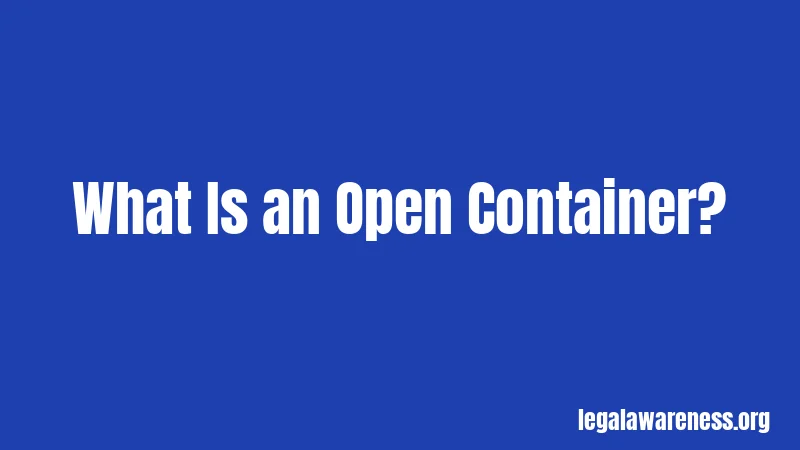Open Container Laws in North Carolina (2026): What Really Counts
Most people have no idea this is even illegal. But in North Carolina, open container laws are strict, and the penalties can hit pretty hard. Let’s break down exactly what you need to know so you don’t accidentally break the law.
Here’s the thing: North Carolina takes drinking and driving seriously. Their open container laws exist to keep people safe on the roads. You could face real consequences if you’re not careful, even if you’re not actually drinking while driving.
What Is an Open Container?

An open container is any drink with alcohol that you can access while you’re in a car. Think of it like this: if someone can see the drink, reach it, or it’s obviously open, it counts. This includes beer, wine, spirits, or any alcoholic beverage.
The key word here is “open.” A sealed bottle in your trunk? That’s fine. A can with a twist-off top that’s been opened? That’s the problem. Pretty straightforward, right?
Basic North Carolina Open Container Laws
What Counts as Illegal
In North Carolina, you can’t have an open container of alcohol in a vehicle. Period. This applies to the driver and any passengers. You’re also breaking the law if the container is open and the vehicle is on a public road or highway.
Hold on, this part matters: the vehicle has to be on a public road. Private property is different. Your driveway? Not covered. A parking lot that’s open to the public? That’s covered.
You can’t have an open container anywhere that’s easily accessible while the car is moving. That means the floor, cup holders, center console, door pockets. Basically any spot where someone in the car can grab it. The trunk is safe because it’s not accessible from the passenger area.
No Exceptions for Passengers
Here’s where it gets important: you can’t claim someone else was drinking. If there’s an open container in the vehicle, both the driver and passengers can get in trouble. Wondering if this applies to you? It does if you’re in the car with the open drink.
Not sure what counts as a violation? Let me break it down simply. The container has to be opened. It has to have alcohol in it. It has to be in the car. All three together equal a violation.
The Real Penalties You Face

So what happens if you break this law? North Carolina doesn’t mess around with this stuff. You could face a fine of up to $200 for a first offense. That might not sound like much, but it’s money out of your pocket.
Think of it like a traffic ticket, but specifically for alcohol. It’s less severe than a DUI, but still no joke. The fine could be even higher if there are other factors involved, like if you’re a repeat offender or if there are other violations happening at the same time.
Here’s what you really need to know: this isn’t just about the fine. An open container violation goes on your record. That can affect other things down the line, like background checks or insurance rates. Honestly, this is the part most people don’t realize.
When Does It Actually Apply?
The law applies when the vehicle is on a public road. But wait, there’s more to this. What exactly counts as “public”? That includes any highway, street, or parking area that’s open to the public. Shopping mall parking lots count. Street parking counts. Gas station lots count.
Private property is different. Your home, your business property, private roads. Those don’t count under the open container law. You can have an open container on your own property without breaking this specific law.
Okay, pause. Read this carefully: the vehicle also can’t be moving. If your car is parked on a public street with the engine off, you might still be breaking the law if there’s an open container inside. The exact rules depend on the situation, but the safest bet is to keep all opened drinks in the trunk.
What About Tailgating and Parties?

Many people assume open containers are okay at tailgate parties or outdoor events. They find out the hard way they’re not. If you’re in a parking lot that’s open to the public, even at a stadium or event venue, open containers are illegal.
That doesn’t mean you can’t drink at these events. You can, but you need to do it responsibly. Some venues have specific rules that allow drinks in certain areas. Always check with the event organizers first.
Personal opinion: this law makes sense. It prevents people from drinking while driving, which keeps everyone safer on the road. The rules might feel strict, but they exist for good reasons.
What About Rideshare and Delivery?
Here’s a question readers ask a lot: what if someone else is driving my car? Does the open container belong to me or them? Both of you can actually get in trouble. The law covers anyone in the vehicle when there’s an open container.
That means if you call a rideshare and there’s an open container in the car before you get picked up, you could face charges. If you’re driving for a delivery service and there’s an open container in your vehicle, same thing. Basically, keep all alcohol sealed and in the trunk.
How to Stay Out of Trouble
Here’s what you need to do. First, keep all open containers in the trunk. This is the safest option. If it’s in the trunk, it’s not accessible from the passenger area, and you’re not breaking the law.
Second, only drink at your final destination. Wait until you’re home or at a bar or restaurant to have that beer. It might seem obvious, but a lot of people don’t think about this until they’re already driving.
Third, if you’re transporting alcohol, keep it sealed. Full, unopened bottles and cans are totally fine. You can carry as much sealed alcohol as you want. The second you open it in the car, you’re breaking the law.
You’re not alone if this confuses you. A lot of people don’t realize how strict these laws are. Just remember: sealed in the trunk is always safe.
Recent Law Changes
North Carolina hasn’t changed its main open container law in recent years, but enforcement has gotten stricter. Police are more likely to pull people over for this violation now, especially during holidays and summer driving season.
One thing to know: the law also applies to beer, wine, and any other alcohol. Some people think beer is treated differently than harder liquor. It’s not. It all falls under the same rules.
Frequently Asked Questions
Can I drink from a sealed bottle? No. The bottle has to stay sealed while the car is on public roads or in a public parking lot. Open it only when you’re safely at your destination.
What if the container is in the back seat, not the front? It still counts as a violation. The location doesn’t matter. Any open container that’s accessible from inside the car is illegal.
Can I have an open container if my car isn’t moving? It depends. If you’re parked on a public road or in a public parking lot, technically yes, you might still be breaking the law depending on whether the engine is running or the vehicle is “in use.” The safest answer is no, don’t do it.
Do I get arrested for an open container violation? Usually not. It’s typically a traffic ticket, not an arrest. You’ll probably get cited and have to pay a fine or go to court.
What if I’m a passenger, not the driver? You can still be ticketed. The law covers everyone in the vehicle when there’s an open container. You’re responsible for your own drinks.
Final Thoughts
Here’s the bottom line: North Carolina takes open container laws seriously, and you should too. Keep your alcohol sealed and in the trunk. Wait until you’re at your destination to drink. Don’t take chances with this one.
The penalties might not be huge, but they’re not worth the hassle. Plus, this law exists to keep people safe. Following it is the smart move. Now you know the basics. Stay informed, stay safe, and when in doubt, keep that drink in the trunk.
